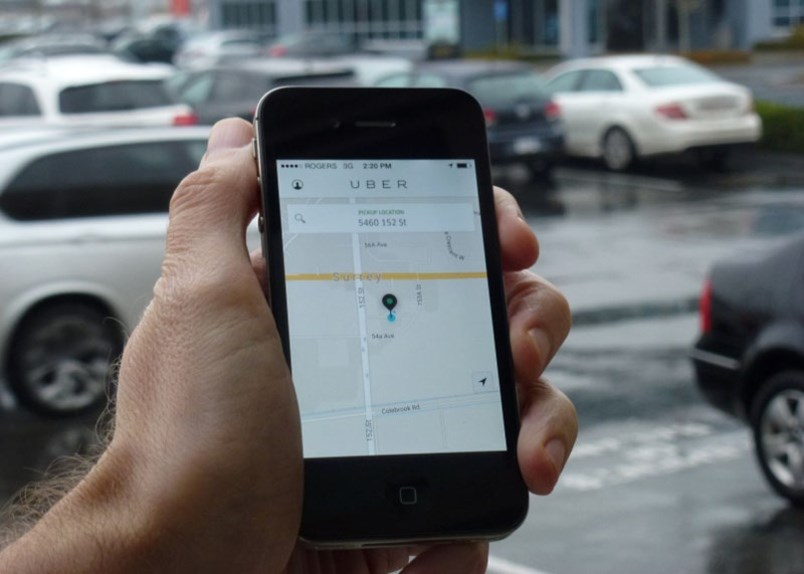Affordability, commerce, safety and freedom of movement are all taking massive hits for every day that the Ubers and Lyfts of the world aren’t on B.C. streets.
That was the message coming out of downtown Vancouver Thursday as the lobby group Ridesharing Now BC trotted out members from a number of industries who want the province to move on moving people across Vancouver and the province.
Amongst the group of at least a dozen speakers were reps from BarWatch, the Vancouver Board of Trade, B.C. Chamber of Commerce and the Vancouver Economic Commission who questioned Vancouver’s position as the largest city in North America without ridesharing.
It was a campaign promise of the provincial NDP last year, but there’s been no indication when the transportation ministry will make the shift. Surrey Board of Trade CEO Anita Huberman has heard rumblings that legislative change may come in the fall or by the end of this year.
“We need ridesharing now,” Huberman said. “We can’t wait until the fall, we can’t wait until Christmas.”
BarWatch chair Curtis Robinson spent years in the Granville Entertainment District as a VPD member and transit police.
“I had a first-hand view of the problems that everybody deals with on Granville Street at 3 o’clock in the morning. The solution to this years ago was late night transportation — it remains true today,” Robinson said. “Late night SkyTrain service til 3:30 in the morning and rideshare would make an incredible difference.”
Safety was a key talking point Thursday, in the context of both work and play.
Vancouver Pride Society executive director Andrea Arnot characterized ridesharing as a tool in harm reduction.
“We are organizers of large events across the city and we’re looking at ways to safely move our staff and participants around the city. Having safe rides where people aren’t drinking and driving [is] super important to us as an organization.”
Competition and political pressure were inevitably linked at the press conference as well. The taxi industry has long opposed ridesharing, and that lobby is politically mobilized. Premier John Horgan has cited fairness for the taxi industry and questioned how having the private industry would work in a province with a public insurer like ICBC as reasons for the rideshare delay.
Poparide CEO and co-founder Flo Devellennes said his company would be in partial competition with Lyft and Uber if they were in operation. Poparide offers longer rides between Canadian cities — Vancouver to Whistler, or Toronto to Montreal for example — and has close to 100,000 members nationwide.
“We truly believe in competition and competition is good because it creates lower prices and better eservices for the consumer,” he said. “It’s all over Canada already, it’s all over the world and we need it.”
Ditto for B.C. Chamber of Commerce CEO and president Val Litwin, whose group lobbies for roughly 36,000 members across the province.
“Certainly we are not advocating for the end of the cab industry as well. We think there is room in the economy for both.
BC Restaurants and Food Services Association CEO Ian Tostenson also acts as the spokesperson for Ridesharing Now BC. He denied that his coalition has any desire to threaten the taxi industry and instead wants legislation in place that complements both sectors.
“There is a place in this economy for everyone. We’re not at all about the seclusion of anyone, we’re about the inclusion of a transit network in British Columbia that makes sense in this emerging economy.”
On the economic front, several people spoke to the “time is money” adage.
Harbour Air Group vice president Chad Wetsch said his company has set up shuttle services at docking points in Vancouver, Victoria, Tofino and Richmond to make up for the lack of ridesharing.
More than 500,000 passengers used Harbour Air last year, but those shuttle services can’t make up for the gaps in demand.
“We’re great at [getting people from] Point A to Point B,” he said. “When you arrive at our terminals though, that’s where the complaints come from… the demand is still too high. We get numerous complaints from our passengers waiting.”
Sean Elbe’s position with the Vancouver Economic Commission is pretty simple on paper — support and foster tech jobs in what is the biggest tech hub in Canada. He’s working with Amazon right now to support what is one of the largest financial and employment commitments in Vancouver’s history.
Where his job gets tricky is explaining to those CEOs and corporate heads that there’s no Uber in the city they’ve just invested in.
“What we hear from the companies that we work with in the fastest-growing sectors off our economy is that no having ride sharing here is a significant problem and we believe that having ride sharing would have a significant economic impact,” he said.



